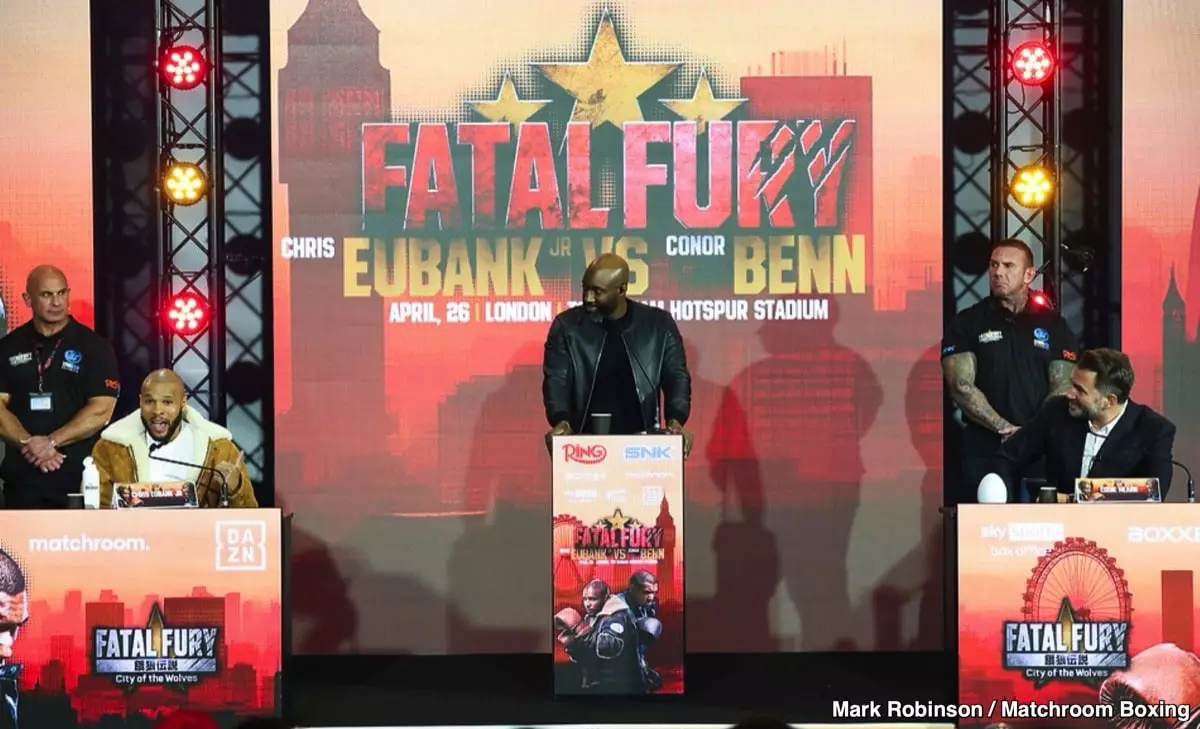As the highly anticipated bout between Conor Benn and Chris Eubank Jr. approaches, the boxing world buzzes with excitement and speculation. Promoter Eddie Hearn describes the clash as a “50-50” encounter, but such claims are laden with skepticism. Hearn has attributed this perceived parity to the significant weight difference, as Benn steps up from 147 pounds to face Eubank Jr. at 160, highlighting the 10-pound rehydration limit imposed before the fight night. While the idea of a 50-50 fight makes for captivating headlines, a closer examination reveals a more intricate narrative.
Benn’s ascent through the ranks has offered glimpses of potential, yet his competition thus far raises questions about his readiness against a seasoned opponent like Eubank Jr. The notion that Benn possesses a fighting chance solely due to a weight class adjustment is misleading at best. The challenges he faces extend beyond mere physics; they delve into experience, skill, and psychological readiness. If size were the sole determiner of success, many underdogs would confound conventional wisdom, yet history often favors those who have fought at elite levels and experienced the pressure of high-stakes situations.
A Fragile Reputation
Conor Benn’s recent performances tell a compelling story of a fighter whose earlier ferocity has waned. The streak of impressive knockouts that once characterized Benn’s matches has, disturbingly, morphed into a series of lackluster showings against below-par opposition. Observers often comment that the “Superman” persona he has cultivated feels more like a distant memory. It’s as if he’s wandered into a field of kryptonite, leaving fans to wonder if the dynamism that once promised greatness can be reawakened.
Critics have pointed to his recent bouts against fighters like Peter Dobson and Rodolfo Orozco as evidence of his stagnation, contending that these matches offered little in the way of challenge or meaningful engagement. Benn’s resume lacks the kind of elite wins that resonate with serious contenders, leading to a sharp contrast when pitted against Eubank Jr., a fighter with a catalog of significant experiences, albeit without an elite marquee victory.
A Stylistic Clash Objects
Eubank Jr. is known for his showmanship and the audacity that has caught the public’s eye throughout his career. He embodies a renegade spirit, standing out in a sport often defined by tradition and conformity. Despite having accumulated wealth, Eubank’s journey in the ring is marred by an absence of fights that could solidify his legacy—an irony in a sport that rewards grit with glory. His status is complicated further by the looming specter of potential matchups that could’ve elevated his standing, yet he remains a fighter with a chip on his shoulder.
Benn, meanwhile, seems trapped in the dichotomy of expectation and reality. The young prospect is aware of the stakes, often grappling with the heavy weight of legacy versus personal pride. As Benn navigates the perilous landscape of perceptions, he openly admits to fearing the implications of defeat more than contemplating the triumph of victory. This self-admission reflects a deep-seated understanding of what a loss to Eubank Jr. would mean—not merely in terms of record, but in the context of legacy and self-identity.
Fears and Ferocity in the Ring
The anticipation leading into Saturday’s showdown raises questions not just about tactical prowess but emotional intelligence in the ring. Conor’s camp knows that overwhelming pressure often leads to mistakes—flaws that a fighter of Eubank Jr.’s caliber can exploit mercilessly. The tales of knockout power may fade into whispers if Benn fails to discover the intensity and aggressiveness that once defined his style. Eubank Jr. thrives on confidence and explosiveness, and if Benn enters the ring burdened by doubt, the contest risks devolving into a masterclass in inactivity.
Nigel Benn, Conor’s father and a boxing legend in his own right, has expressed unwavering faith in his son’s innate capabilities. He suggests that once Conor lands his punches, Eubank Jr. will falter, painting a picture of explosive potential hidden beneath the layers of pressure. Yet, such optimism hinges on a faith that may not align with reality unless Conor finds a way to rekindle the competitive ferocity that characterized him early in his career.
As the countdown accelerates toward fight night, all eyes are laser-focused on how these contrasting narratives—of experience and impulsiveness, of expectation and reality—will collide in the ring. Will Conor Benn rise to the occasion or will Chris Eubank Jr. confirm his status as the more accomplished fighter? In boxing, nothing is predictable, and as history shows, nothing is guaranteed.

